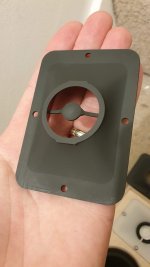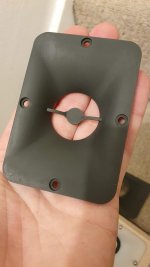I just wanted to share some photos of these parts that came today.
These waveguides are were designed using ATH and Fusion 360, then 3D printed in resin by JLCPCB.com and they were cheap, too! About $10 + shipping. I got some in black and some in white. I added a note to tell them only use printing supports (help them to print it) on the back so the front stays good looking.
I made my own using FDM 3d printing first for testing the acoustics, but you see the rough layers using that method (looks rather DIY). These look really smooth and have great detail. There are a few minor scuff marks but they are barely noticeable. I'll be spray painting them anyway, but I'm very pleased 🙂
If you don't have a 3D printer or want more professional looking detailed parts I'm happy to give a recommendation to JLC.
These waveguides are were designed using ATH and Fusion 360, then 3D printed in resin by JLCPCB.com and they were cheap, too! About $10 + shipping. I got some in black and some in white. I added a note to tell them only use printing supports (help them to print it) on the back so the front stays good looking.
I made my own using FDM 3d printing first for testing the acoustics, but you see the rough layers using that method (looks rather DIY). These look really smooth and have great detail. There are a few minor scuff marks but they are barely noticeable. I'll be spray painting them anyway, but I'm very pleased 🙂
If you don't have a 3D printer or want more professional looking detailed parts I'm happy to give a recommendation to JLC.
Attachments
The type of 3D printing most people would have at home is done using thermoplastic such as PLA, PETG or ABS that is melted and deposited via a nozzle physically moving around (FDM). This method (SLA) uses a UV curable resin in a tank which is set via a UV light and an LCD (in most cases) to mask areas from the light. The resolution that can be produced therefore is MUCH higher for resin type systems rather than those that physically squirt plastic from a nozzle. There are home SLA resin printers but it's a messy smelly job that involves chemicals - I've never been tempted to try it.
There are different types of resin offered by JLC and even other printing methods like multi-jet fusion that can do multi-colour parts from nylon so you could make it look like mahogony ($$). But for this type of application I used the cheapest resin. It is fairly stiff and inert like you might expect from common injection moulded plastics you are probably familiar with. However the cheapest resin does not tolerate higher temperatures +60C very well. That is not a consideration here so little point paying extra for some of the other options.
There are different types of resin offered by JLC and even other printing methods like multi-jet fusion that can do multi-colour parts from nylon so you could make it look like mahogony ($$). But for this type of application I used the cheapest resin. It is fairly stiff and inert like you might expect from common injection moulded plastics you are probably familiar with. However the cheapest resin does not tolerate higher temperatures +60C very well. That is not a consideration here so little point paying extra for some of the other options.
Though I am ignorant when comes to 3D printing in general, it only made sense that there was more than one way to do it. When considering any such sort of work to be done for me, I sometimes ask questions of the company doing the work that apparently aren't common enough for them to have a ready answer.
I really appreciate the response that you gave in that it makes me think what to consider should I ever want to have this sort of work done. The resolution is an important consideration for some projects such as yours.
I really appreciate the response that you gave in that it makes me think what to consider should I ever want to have this sort of work done. The resolution is an important consideration for some projects such as yours.
The most common printing types can produce high resolutions but resin printing is popular with model builders, eg for figurines.



